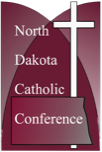When it Comes to Ethics, Facts Matter
by Christopher Dodson
Executive Director
North Dakota Catholic Conference
July 2019
Misinformation and false claims seem to abound lately like the summer grass. From abortion lawsuits, to Planned Parenthood education programs, to immigration border crisis, the news has been filled with partial, misleading, or just plain false information.
Although all deserve attention, this month's column focuses on the new ethics law passed in November and legislation just passed to help put it into effect. Knowing the truth about the new law will contribute to your ability to participate in the political process with confidence.
Claim: The legislature had no authority to define “ultimate and true source" when it comes to what lobbying and election contributions have to be disclosed. Some people claim that the parameters of the disclosure law should be left to the new ethics commission.
Truth: The express language of Measure 1, now Article XIV of the state constitution, gives the Legislative Assembly — and only the Legislative Assembly — the power and duty to define the terms so that they can be implemented in a clear and legally enforceable manner. In fact, the proponents of Measure 1 admitted as such more than ten times as in public interviews before the election.
Claim: By defining “ultimate and true source” as money knowingly given solely for lobbying or campaigns, the legislature created a loophole whereby someone could hide a contribution by bundling it with money used for another purpose. This is absolutely false. If someone intentionally gives $200 or more for lobbying or a campaign the contribution must be reported. Mixing it with money for other purposes does not create an exception.
The “solely” language is vitally important. Without it contributions made to the general operation of an organization, such as a church, would all have to be disclosed if the organization used some of the money to express a position on a public issue. The privacy of parishioners and charitable givers would be unnecessarily violated and religious and charitable organizations would be discouraged from participating in society.
Some of the proponents of Measure 1 said that they were not interested in those names, but no better legislative solution presented itself. Keep in mind, however, that one spokesperson for Measure 1 stated that the Catholic Church “liked dark money” and should be forced to reveal who was paying for its “political actions.” In other words, the individual wanted your name. Apparently, speaking out for human life, religious freedom, and the poor is using your “dark money” and you should be harassed for it.
In short, “solely” was needed to protect the privacy of general donors and make Article XIV workable.
Claim: By limiting the definition of “lobbyist” to individuals required to register as lobbyists under the Century Code other “lobbyists” can skirt the ban on lobbyists giving gifts to legislators.
Truth: The claim is partly true, but is mostly a nonsensical statement made to sound bad.
Article XIV bans gifts from lobbyists to public officials, but it does not define “lobbyist.” The only definition of “lobbyist” in the law is the one that exists in the Century Code that requires individuals who represent someone else on a legislative matter to register as a “lobbyist.” In a sense, there is no such thing legally as a non-registered lobbyist.
This makes sense and protects your ability to participate in the democratic process. Without a limiting definition, anyone could be considered a “lobbyist” and unknowingly be subjected to all kinds of laws and penalties.
Claim: The definition of lobbyist allows organizations who hire lobbyists to give gifts to public officials.
Truth: This is true, but Article XIV did not ban organizations who hire lobbyists from giving gifts. It expressly banned gift-giving only by lobbyists. If the legislature banned organizations from giving gifts it would have gone beyond the mandate of Article XIV. Keep in mind, however, that those “gifts” would still have to be disclosed under Article XIV if they were over $200 and were for the purpose of lobbying or influencing government action.
Claim: Article XIV and the implementing legislation created a loophole that allows former lobbyists to serve on the ethics commission.
Truth: True, but it is not a loophole. This issue goes back to the lack of definition of “lobbyist” in Article XIV. Without a definition anyone could be called a “lobbyist” and be barred from serving on the ethics commission. By defining “lobbyist” as those individuals required to register as lobbyists under the Century Code, the implementing legislation allows more individuals to serve on the ethics commission.
Someone who is a lobbyist under the law, however, is may not always be a lobbyist, just like I would no longer be an attorney if I did not pay my bar dues each year. The lobbyist registration period is for one year. Someone who has stopped representing others in the legislative process, and therefore not required to register as a lobbyist, can serve on the ethics commission.
This does not mean that the ethics commission will be stacked with former lobbyists. Article XIV requires that the Governor, the Senate majority leader, and the Senate minority leader choose by consensus who serves on the ethics commission. The “check” on too many former lobbyists rests with them.
Sometimes it seems like that campaign over Measure 1 is still being fought. Unfortunately, that means that, as during a political campaign, do not always believe what you read or hear.
.
What We Do
The North Dakota Catholic Conference acts on behalf of the Roman Catholic bishops of North Dakota to respond to public policy issues of concern to the Catholic Church and to educate Catholics and the general public about Catholic social doctrine.

Contact Us
North Dakota Catholic Conference
103 South Third Street, Suite 10
Bismarck, North Dakota
58501
1-888-419-1237
701-223-2519
Contact Us

